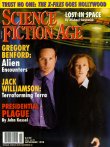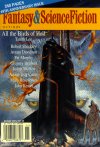Stories published November 1998
reviewed by Mark R. Kelly
 Asimov's October/November 1998
Asimov's October/November 1998
Bruce Sterling, ''Taklamakan''
Forming a set with ''Deep Eddy'' and the Hugo-winning ''Bicycle Repairman'', this tale finds two high-tech intrusion freaks in the middle of a desolate Asian desert in search of a secret rocket base. Instead they find a vast cavern containing three mock-starships with people inside who may or may not believe they're really on their way to the stars. This is the skiffiest story Sterling has written in a long time, but it retains his trademark techno-savvy, here in the depiction of a robotic ecology whose implications for technological evolution promise true social revolution.
Ian R. MacLeod, ''The Summer Isles''
Alternate history novella about Griffin, an Oxford don and closeted gay man living in a 1940 England led by the populist John Arthur, who took ''what people said over the garden fence and turned it into Government policy''. When Griffin is invited by Arthur to attend an official function in London, old secrets about Griffin, a former lover of Griffin's from his student days, and John Arthur come to the surface. An absorbing, beautiful, and ultimately harrowing tale: one of the best of the year.
Robert Reed, ''Whiptail''
The narrator is taken by her lover to meet the lover's devastated family for the first time, and learns about an experiment (inspired by whiptail lizards) to save humanity from the same fate. This is a crafty tale in classic SF style in which nothing is taken for granted and the reader must deduce things the characters either don't understand or so take for granted they're never mentioned. Hint: it's about clones.
(Sat 21 Nov Oct 98)
 Science Fiction Age November 1998
Science Fiction Age November 1998
Michael Swanwick, ''Microcosmic Dog''
A woman lives the high life in a version of New York City that's wrapped around the inside of an asteroid, until people around her start disappearing. This could be called Swanwick's version of ''The Truman Show'', with more than a sly wink toward Theodore Sturgeon's ''Microcosmic God'', a classic story about an artificial enclosed society.
Gregory Benford, ''A Dance to Strange Musics''
The first starship to Alpha Centauri discovers a planet with an ocean-sized disk of water suspended 10 km in the air, and an electrical ecology consisting partly of geometric tiles covering the surface. This is old fashioned hard SF with plenty of plausible science balancing sense-of-wonder speculations about humanity's ability to comprehend the ancient, vast universe.
David Ira Cleary, ''The Mechanical Grammar''
In a steampunkish alternate Europe (setting of a couple earlier Cleary stories), an obvious charlatan promotes a device to create profound statements without the trouble of anyone having to think them up -- to the dismay of a scholarly, skeptical observer. This is a fascination examination of ''the evolution of a myth'', the way theories and beliefs form by hook or by crook.
(Sat 21 Nov 98)
 F&SF October/November 1998
F&SF October/November 1998
(issue profile)
Judith Moffett, ''The Bradshaw''
A new story in the author's sequence about the alien Hefn (The Ragged World, etc.). Pam Pruitt, retired from Hefn's Bureau of Temporal Physics, now has a personal time transceiver or ''bradshaw'' at her disposal. She uses it to probe her dimly remembered childhood relationship with her father. Did he abuse her? Why did she throw away a crucial diary? Moffett creates a compelling scenario that doesn't demonize adults or trivialize childhood trauma, but does explore the subtle ways slight misunderstandings can fester into adult discontent. Smooth and compelling.
John Kessel, ''Every Angel Is Terrifying''
Railroad and two pals, all escapees from a hospital for the criminally insane, rob and murder a family in a Studebaker. But something one of his victims said bothers Railroad, leading him to abandon his pals and attempt to lead a straight life. Kessel creates a character that ranks with Bradley Denton's Blackburn as an example of a violent man who's not simply stupid, but whose sense of right and wrong is erratic because he thinks about things too much.
Tanith Lee, ''All the Birds of Hell''
In a future Industrial Winter a Russian bureaucrat vacations at a dacha where a famous frozen couple lies dead in an unheated upstairs bedroom. Tourists come to see the couple, and a famous poem has been written about them. Then one day a Russian submarine emerges in a nearby lake to take the couple away. The story is SF, not fantasy, unusually for Lee, and it depicts a world descending into gloom with Ballardian intensity.
Mary Rosenblum, ''The Rainmaker''
In a remote desert town a rainmaker pitches his services while Donny's Uncle Kenny, the sheriff, sure the guy is a fraud, means to run him out of town. Donny isn't so sure about the rainmaker, or his uncle, and his ability to see ghosts out in the desert is key to solving a mystery about a missing man. The story's interlocking plotlines and setting are reminiscent of John Sayles' film Lone Star.
(Sun 18 Oct 98)


 Asimov's October/November 1998
Asimov's October/November 1998 Science Fiction Age November 1998
Science Fiction Age November 1998 F&SF October/November 1998
F&SF October/November 1998